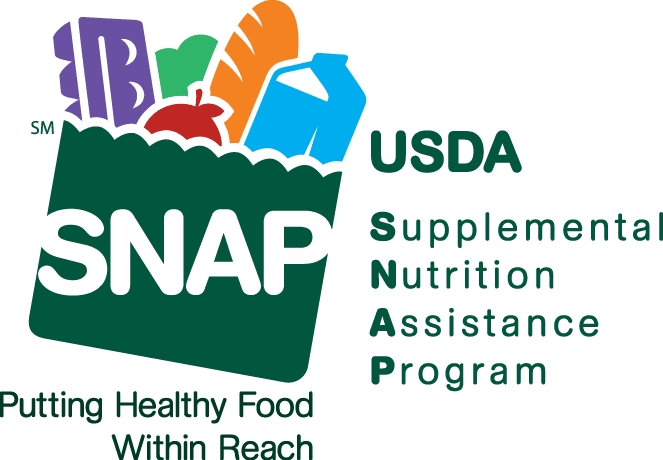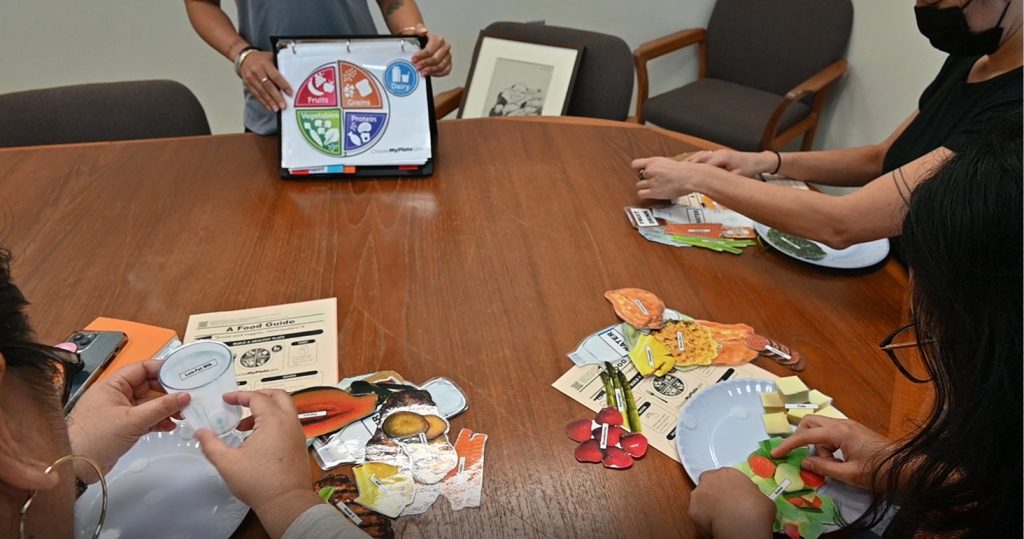

The Hawaiʻi SNAP-Ed program primarily services single adult populations by teaching them ways to live full healthy lives through nutrition education and physical activity. Nutrition education lessons are also available to youth populations in designated areas across the islands. Hawaiʻi SNAP-Ed also offers special projects, like Food to Grow, that address access to healthy foods in various settings.
Please see more testimonials supporting our SNAP-Ed programs on our Food and Money Basics page, Food to Grow Agencies page, and Food to Grow Participants page.
As a young single mother, SNAP-Ed was incredibly helpful. I learned how to prepare meals to feed my young family. I learned how to use different veggies to make healthy meals. I was also able to use fruits in ways I had never thought of before. If it wasn't for SNAP-Ed when I was young and inexperienced, I would have never been able to introduce the wonderful world of fruits and veggies to my family. Now that I'm older and married, I still use some of the skills I learned from SNAP-Ed. Much appreciated. ~ Hale Puna Farmers Market vendor (Waimea, Kauaʻi)
At Lanakila Multi-Purpose Senior Center, our mission is to promote the dignity of each person by helping others empower themselves. We provide a wide range of social services with compassion and a commitment to excellence. Partnering with SNAP-Ed has significantly enhanced our ability to fulfill this mission. Through SNAP-Ed's evidence-based nutrition education and wellness initiatives, our agency has seen measurable improvements in both client engagement and health outcomes. The resources provided by SNAP-Ed—including interactive workshops, cooking demonstrations, and culturally relevant educational materials—have empowered our clients to make healthier food choices within their budgets. Our staff has also benefited from SNAP-Ed’s training and collaborative support, which have helped us integrate nutrition education more effectively into our existing programs. The partnership has strengthened our program, allowing us to reach more families and individuals with practical, accessible tools for improving their nutrition and physical activity. We are proud to collaborate with SNAP-Ed and are continually inspired by the positive impact it has on our clients' lives. This partnership has been instrumental in creating a healthier, more informed, and more resilient community. ~ Susie Chun Oakland, Program Director, Lanakila Multi-Purpose Senior Center
As a nonprofit HUD affordable fair housing organization dedicated to promoting wellness and food security in partnership with community health agencies, our collaboration with SNAP-Ed has been truly transformative. Through collaborative nutrition education workshops and hands-on cooking demonstrations, our residents and our Kupuna have gained invaluable knowledge about healthy eating, budget-friendly meal planning, and making informed food choices. We have witnessed firsthand how SNAP-Ed’s resources empower individuals and families to take control of their health, leading to improved dietary habits and greater confidence in the kitchen. Many residents have shared stories of trying new fruits and vegetables, preparing more meals at home, and feeling better equipped to manage their sugar and salt intake. Beyond the impact on residents and Kupuna, working with SNAP-Ed has strengthened our ability to deliver holistic, preventive care. The evidence-based approach and culturally relevant materials have enhanced our programming, allowing us to better meet the diverse needs of the populations we serve. This collaboration directly supports our mission to improve community health outcomes and reduce health disparities. We are proud to continue this partnership and look forward to the ongoing positive changes it brings to our community. ~ Christina Marie Whinnery, Resident Services/Property Management Senior Associate, Kekaulike Courtyards
I am a Case Manager with Catholic Charities Hawaii; our mission is to promote the dignity of each person by helping others empower themselves. Partnering with SNAP-Ed has significantly enhanced our ability to fulfill this mission. The resources provided by SNAP-Ed include interactive workshops, cooking demonstrations, and culturally relevant educational materials. As a result, I have witnessed my elderly adult clients learn new facts, try new foods, and adopt and sustain healthier eating habits and engage in physical activity. It has also empowered my clients to make healthier food choices within their budgets. I am proud to collaborate with SNAP-Ed and am continually inspired by the positive impact it has on my clients' lives. This partnership has been instrumental in creating a healthier, more informed, and more resilient community. ~ Brandi Kitashima, Case Manager, Catholic Charities Hawaii
At Partners in Development Foundation, our mission is to inspire and equip families with resources that will support the health and welI-being of our community, families, and keiki through education, resources, and direct services. ... We are proud to collaborate with SNAP-Ed and are continually inspired by the positive impact it has on our clients' lives. This partnership has been instrumental in creating a healthier, more informed, and more resilient community. ~ Cheri Richards, Family Education Service Manager, Partners in Development Foundation
Very educational. We need more programs like these to help keep people healthy and a great awareness for healthier lifestyle. Mahalo. ~ Da Market (run by Maui Food Bank) food pantry participant (Lahaina, Maui)
Hawaii’s geographic isolation and high cost of living make food security a serious issue. Many families here find it difficult to afford fresh, healthy food due to the expense of importing goods and limited local agricultural capacity. SNAP helps bridge that gap by providing access to nutritious meals. Programs like SNAP-Ed further enhance this effect by offering nutrition education that reflects the diverse traditions and tastes of Hawaii’s residents. Cooking demonstrations and workshops often incorporate local ingredients, helping families make healthy choices while supporting local farmers and food producers. ~ Rona Fukumoto, President & CEO, Lanakila Pacific
At Better Tomorrows, our mission is to mobilize resources and magnify opportunities for our residents and communities. We create healthy, sustainable communities today that lead to better tomorrows. Partnering with SNAP-Ed at Halewai'olu Senior Residences has significantly enhanced our ability to fulfill this mission. ~ Anni C. Peterson, M.S. Director of Hawaii Operations Better Tomorrows - Hawaii
I collaborated on a research study with SNAP-Ed Hawaii. I am an Assistant Professor at the University of Hawaii Cancer Center. The passion of the staff that work for SNAP-Ed, the engagement of the students in the program, and the evidence-based impact SNAP-Ed has on improving diet quality of Hawaii youth. Plan to continue working with SNAP-Ed to provide evidence-based nutrition education to improve diet quality of Hawaii youth. For most youth in Hawaii, SNAP-Ed is the only nutrition education they receive at school. ~ Dr. Chloe Lozano
Food and Money Basics is a practice-based learning curriculum which teaches participants practical life and food skills.
The Hawaiʻi - Food and Lifeskills for Youth (HI-FLY) program engages youth grades 6-12 in healthy eating and active living behaviors to provide the foundation and skills necessary to live a long healthful life.
UH Food to Grow offers free seedling kits and supplies to low-income populations to increase their access to healthful foods and improve vegetable intake by encouraging recipients to start their own produce gardens at home.
"Got EBT?" signage at farmers markets encourages the use of SNAP benefits/EBT to purchase fruits and vegetables.
Explore outdoor places in your community to be active throughout the islands of Hawaiʻi, exercise videos for staying active indoors in the comfort of your home, and other materials to help make physical activity a part of your lifestyle. Find new ways to be active every day!
This institution is an equal opportunity provider. SNAP-Ed and EFNEP programs serve low-income households and communities.
In accordance with federal civil rights law and U.S. Department of Agriculture (USDA) civil rights regulations and policies, this institution is prohibited from discriminating on the basis of race, color, national origin, sex (including gender identity and sexual orientation), religious creed, disability, age, political beliefs, or reprisal or retaliation for prior civil rights activity.
Program information may be made available in languages other than English. Persons with disabilities who require alternative means of communication to obtain program information (e.g., Braille, large print, audiotape, American Sign Language), should contact the agency (state or local) where they applied for benefits. Individuals who are deaf, hard of hearing or have speech disabilities may contact USDA through the Federal Relay Service at (800) 877-8339.
To file a program discrimination complaint, a Complainant should complete a Form AD-3027, USDA Program Discrimination Complaint Form which can be obtained online at: https://www.usda.gov/sites/default/files/documents/USDA-OASCR%20P-Complaint-Form-0508-0002-508-11-28-17Fax2Mail.pdf, from any USDA office, by calling (833) 620-1071, or by writing a letter addressed to USDA. The letter must contain the complainant’s name, address, telephone number, and a written description of the alleged discriminatory action in sufficient detail to inform the Assistant Secretary for Civil Rights (ASCR) about the nature and date of an alleged civil rights violation. The completed AD-3027 form or letter must be submitted to:
hnctr@hawaii.edu | 1955 East-West Road #306 | Honolulu, Hawaii 96822 | (808) 956-4124